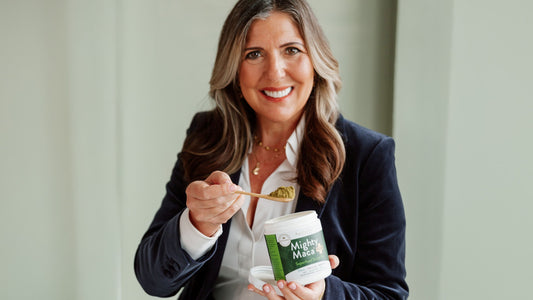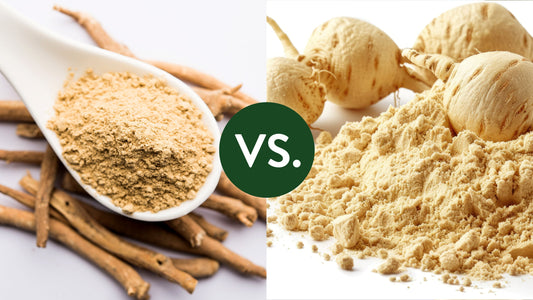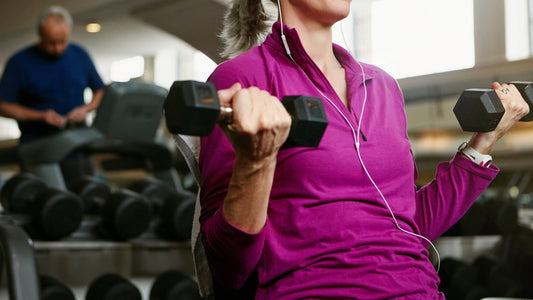We’re living in anxious times. In addition to all the scary things you might hear on TV any given day, our bodies are still going through their normal phases. Regardless of what’s going on in the world, you can still stump your toe, get a crick in your neck or trip in the parking lot and skin your knee. Bills still have to be paid each week. Our families still need food, love, medical care, education, and even some entertainment.
When you add it all up, it can result in excessive anxiety. I recall a mother of three who came into my office complaining of headaches and insomnia. When we began to talk, Doris told me that she was irritable and often snapped at her husband and kids. She was worried there was a much bigger problem going on. People often think the worst.
Start with Testing
We ran some tests on her and found out that she was in perimenopause. She really didn’t know much about this period in a woman’s life and I’ve found that to be true more often than not. Perimenopause is that time in a woman’s life when her body is heading toward menopause but not quite there yet. It is accented by fluctuating hormones. One day you might feel great but the next you may be irritable, have headaches and feel exhausted.
One moment you’re laughing at the dinner table with your family and the next you’re in tears. It can be a very troubling time for many women. That’s especially true right now with the additional worries we are experiencing over the health and well-being of our loved ones. Add to that the fact that many people have been laid off work and the entire family may be spending a bit too much time together. We’re all accustomed to going off to work and school each day and that breaks up our routine quite a bit.
Though many physicians will prescribe antidepressants or sleep drugs for conditions like this and while it may be appropriate and needed, when possible, I don’t like to start there. My approach is to find out what’s at the root of these problems, then fix those issues. If you still need an antidepressant, then we can prescribe that. Typically, when we get to the root of the issues causing the symptoms, we more often don’t need to and can wean those who are on these meds off easily over time.
What I did for Doris was to begin with a thorough exam, hormone panels, and blood tests like those found here. These revealed that she was indeed in perimenopause and her progesterone levels were low. Progesterone is the calming hormone. Her estrogen was low too and that was aggravating her irritability and anxiety. When we stay in a constant state of worry, our bodies create cortisol and this hormone can cause many distressing problems like weight gain, depression, brain fog and anxious thoughts.
Balance Hormones by Detoxing
The first step to getting healthy again is to detox your body. We all need to do this from time to time because we often don’t eat right, we don’t get enough sleep and we collectively worry too much … even when there isn’t a national crisis.
I put Doris on my Keto-Green Detox. That’s a great place to start and it’s fully outlined in my book The Hormone Fix and my latest book Keto-Green™ 16 has an additional plan. This strategy focuses on understanding three control hormones: cortisol, insulin, and oxytocin. Once we get these three in balance, things will turn around quickly. My plan includes some healthy vegetables that help us detoxify our bodies because they’re alkaline vegetables. They include my favorites in the Cruciferous family such as Brussel sprouts, broccoli, cabbage, cauliflower and more.
They work well because they contain powerful plant chemicals, namely indole-3 carbinol (I3C) and diindolylmethane (DIM). These detoxify harmful estrogen molecules from the environment and restore hormonal balance. There are a few other vegetables that also provide exceptional benefits including all the green leafy vegetables, garlic, onions, and scallions.
Eating Healthy
When detoxing, it’s important to focus on foods that boost a brain chemical called gamma-aminobutyric acid (GABA). These foods include green tea, shrimp, cherry tomatoes, kefir and all other foods that are high in omega-3 fats like salmon. These foods will help your brain produce GABA so it remains in a state of calm and peace. If you’d like to learn about keeping your body functioning optimally by eating the right foods, then check out my Couch Talk podcast with Ali Miller.
As we age, things like GABA, progesterone, and estrogen begin to decline. This can leave you feeling anxious, depressed and irritable. You may not sleep well at night. You gain weight easily. If this sounds like you, then there are some things you can do about it.
To treat these symptoms, I prescribe a progesterone topical cream with 20 milligrams of progesterone and 10 milligrams of pregnenolone per pump dosage, my Balance cream, applied in the evening at bedtime. I use my formula Mighty Maca® Plus and Chastetree berry to increase progesterone. If you’d like to learn more about this topic, I have a blog called Natural Progesterone Research and References.)
Supplements That Can Help
I also recommend some great supplements that your body could benefit from. One of my favorites is magnesium, known as the relaxation mineral. Those who suffer from anxiety on a regular basis are often deficient in magnesium. This mineral stimulates GABA receptors on cells for a calming effect. When we’re stressed out for long periods of time, our bodies can be depleted of magnesium. We simply use it all up. And that makes supplementing essential. I recommend 250 milligrams (you can go up to 1,000 milligrams) right before bedtime. If you experience loose stools, then back off on your dosage.
Magnesium l-threonate is a reliable form of this supplement that has been shown to be better for sleep and anxiety. It crosses the blood-brain barrier. (See Better Brain and Sleep formula)
An omega-3 fatty acid is another good supplement that restores tranquility and reduces stress-producing chemicals in the body. You can find omega-3 supplements that have 360 milligrams EPA and 240 milligrams DHA per 1,000-milligram capsule. The recommended dosage is 1,000 milligrams (with 360 milligrams EPA and 240 milligrams DHA) once in the morning and again in the evening.
5-HTP is another supplement that I recommend in the beginning to help with anxiety, insomnia, PMS, appetite, headaches and migraines. 5-HTP works in the brain and nervous system to produce the neurotransmitter serotonin which regulates mood, sleep, appetite and body temperature. Serotonin rich foods are integrated into the Keto-Green diet plans. When needed, I typically start clients on 50mg of 5-HTP at bedtime and increase to twice a day and 100mg as needed. Our B vitamins are necessary as well, especially B6 beginning at 5 mg. Choose the bioavailable forms as in my supplements on my website for what I consider the gold standards and personally use.
Why Mighty Maca® Works
Mighty Maca Plus is a tried and true green superfood drink that helps your body deal with stress, anxiety and hormone-related problems. It’s grown high up in the Peruvian Andes and is known as an “adaptogen” because it enables your body to better deal with stress.
According to a 2014 review study published in Revista Peruana de Medicina Experimental y Salud Publica, it exerts anti-anxiety and antidepressant properties. (Please see my blog on Mood, Energy, Health, Chocolate and Maca to learn more about the health benefits of maca.)
Other Avenues of Support
Of course, a great massage can make you feel so much better. Be sure to treat yourself occasionally to Swedish, deep tissue or hot rock massage therapy. Yoga and meditation work well for some. Exercise is another all-natural way to feel better and improve your overall mood and hormones.
So you see, there are lots of amazing ways we can start feeling better and shedding that stress and anxiety without taking drugs. (You can test your urine pH to give you clues to see how well you manage cortisol - see my blog here.)
Get Your Life Back & Get Back to Life!
My patient, Doris, followed my recommended plan and she started feeling better right away. She was able to shake that anxiety and stress and start smiling again. Her marriage improved as well. She and her husband decided to check out my Sexual CPR program and they both said it really helped them regain their intimacy.
Regardless of what’s going on in the world, let’s take care of ourselves. By doing so, we take care of those around us.
Together, let’s eat well, move well, think well, sleep well and love well.



